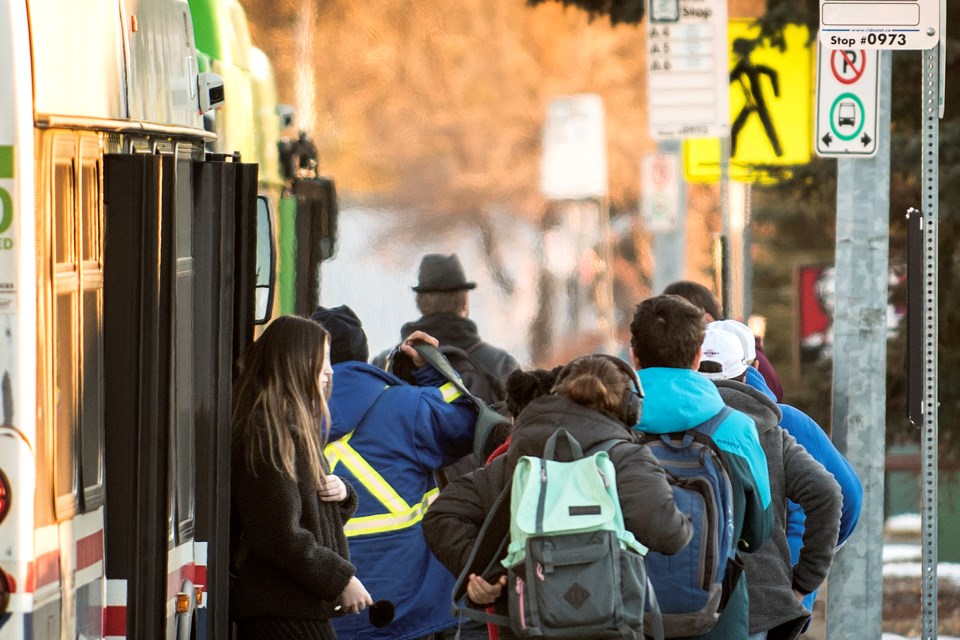This story has been updated with comments from councillors.
Transit in the Edmonton region is a step closer to a seamless future, now that St. Albert has become the first municipality to give approval for a regional transit system.
On Monday, city council voted 6-1 on a motion to support folding St. Albert Transit into a regional system. The vote followed on the heels of the Regional Transit Services Commission (RTSC) transition team releasing its final report Jan. 22, which was drafted by Ernst & Young.
Coun. Wes Brodhead, who sat as chair of the RTSC, said council faced a “generational opportunity to truly change for the better.”
“The numbers are real; we can take them to the bank,” he said. “So, council members, this is a good deal, and I’m going to acknowledge that every time we are contemplating doing something new, that there is risk involved.”
However, the benefits “far outweigh the risks,” Brodhead said.
At press time, other municipalities had yet to vote on similar motions to support the transit system. Up to 13 municipalities could form the bones of a seamless, integrated transit system that would eventually allow residents to travel between communities using a single pass.
Edmonton, Strathcona County and St. Albert would be the top three players in a regional commission. The report showed the commission would be fully standing in 2022 and provided financial projections up to 2026.
St. Albert would have a 19-per-cent cost share allocation, paying on average $11 million annually. The report said transferring transit services to a regional commission could save St. Albert $80,000 per year.
Regionally, reducing the amount of buses passing each other on the road could result in savings of up to $3.4 million when the commission is fully functional.
Most recent efforts to connect the region’s transit systems began in 2017, when Edmonton and St. Albert kicked off investigating potential for a regional commission together.The following year, all 13 municipalities on the Edmonton Metropolitan Regional Board signed a memorandum of understanding, and the Alberta government supported the commission’s work with a $3.7-million grant.
All municipalities with existing transit systems would upload their entire systems, with the notable exception of Edmonton. Only 12 per cent of Edmonton Transit Services (ETS) routes would be handed over to the commission at the start, but after the first five years ETS would be fully part of the commission.
Mayor Cathy Heron said during debate regional transit is not a leap of faith, but rather a “leap based on good faith.”
“And this is the kind of decision that requires a politician and an elected official to have the stomach to make this decision,” she said.
Coun. Sheena Hughes was the sole member of council to vote against supporting the commission, saying she could not “give away, or substantially dilute” the city’s autonomy for 25 cents per month off residents’ tax bills, referencing the $80,000 found in efficiencies.
“I really hope this model does work out, and 10 years from now I hope the council of that day does not regret the decision of the council today,” she said.
Coun. Ken MacKay ultimately supported the proposal after questioning Ernst & Young prior to a vote.
According to Ernst & Young associate partner Alan Tom, municipalities within a commission would still have flexibility to manage its own service. Say for example St. Albert was contemplating free ridership, Tom said the city would just need to notify the commission’s board.
In addition, the proposed governance structure would protect municipalities from being forced into decisions. However, the big three members (St. Albert, Strathcona County and Edmonton) would hold a cumulative 87 per cent of the cost allocation, and could potentially veto decisions.
“But it doesn’t allow for three municipalities ... to force a decision,” Tom said.
Coun. Jacquie Hansen, who phoned in, said she is “very supportive” and that when people are connected, economic development increases, among other shared benefits.
“It’s much bigger than transit, so it’s very exciting,” Hansen said.
St. Albert was the first of the 13 municipalities to vote to join the commission, while Edmonton is tentatively set to vote Feb. 19.
Tom said the transition team did not consider what happens if some municipalities decide against joining the commission, and the model may need to be revisited after all the votes are in.
Heron called the commission in an interview “kind of a legacy-building initiative,” and that approval of a regional transit system signals the region is “open for business.”
Number of routes cut
During his presentation, Tom said all current service levels in St. Albert would be maintained. But some routes would be amalgamated.
Under a commission there would be three types of service in the region: rapid transit, regional express and major trip attraction.
According to the conceptual design, five of St. Albert’s current commuter routes (201, 202, 207, 208, 211) would be replaced by one rapid transit route through downtown Edmonton to Sherwood Park.
The city would be connected with Fort Saskatchewan through a commuter route passing through St. Albert to West Edmonton Mall. A second commuter route would bring residents to South Edmonton, at the Leger Transit Centre.
Morinville would also be connected with the region, through a peak regional express to St. Albert.
After each municipal council votes on membership to the commission, a formal application will be made to the Alberta government this spring. After that, there could be a $881,000 cash call to the region to cover startup costs. According to an administrative report, St. Albert's portion of that could range from $169,000 to $276,000 but would be reimbursed by the commission.




